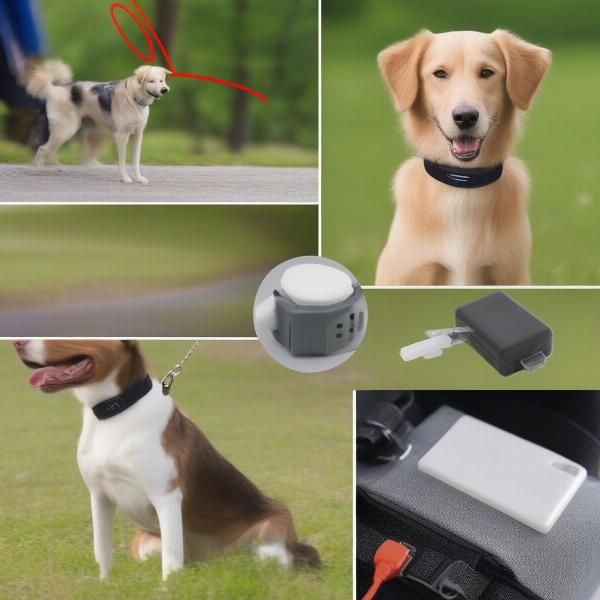Bell dog collars are a popular choice for many dog owners, often chosen for their charming sound and perceived ability to help locate a dog. However, there’s much more to consider than just the jingle. This comprehensive guide will explore the various aspects of bell dog collars, from their purpose and benefits to potential drawbacks and important considerations for choosing the right one for your furry friend. We’ll delve into the different types available, address common concerns, and provide expert advice to help you make an informed decision.
Understanding the Purpose of Bell Dog Collars
The primary function of a bell dog collar is to make a dog’s location audible. This can be particularly useful for dogs that tend to wander or get lost easily, especially in areas with dense vegetation or limited visibility. It can also be helpful for owners who have multiple dogs, allowing them to easily distinguish between their pets. Beyond practicality, some owners simply enjoy the pleasant sound of the bell, adding a touch of charm to their dog’s everyday attire. However, it’s crucial to understand the potential impact on your dog and the environment.
Choosing the Right Bell Dog Collar for Your Dog
With a wide variety of bell dog collars available, selecting the appropriate one depends on your dog’s size, breed, and lifestyle. Consider the material, size and number of bells, and overall collar design. For smaller dogs, a lightweight collar with a small, delicate bell is preferable. Larger dogs may benefit from a more robust collar with a larger bell to ensure audibility.
Material Matters: Durability and Comfort
Bell collars are typically made from materials like nylon, leather, or fabric. Nylon collars are durable, weather-resistant, and easy to clean, making them a popular choice for active dogs. Leather collars offer a more classic and stylish look, but require more care and maintenance. Fabric collars can be a comfortable option, but may not be as durable as nylon or leather. Choose a material that suits your dog’s activity level and your personal preference.
Addressing Concerns about Bell Dog Collars
Some dog owners express concerns about the potential negative effects of bell collars, particularly regarding noise levels and potential stress for the dog. While a constantly jingling bell can be irritating for both dogs and owners, choosing a collar with a single, softly-tinkling bell can minimize this issue. If you notice signs of stress or anxiety in your dog, such as excessive scratching or changes in behavior, it’s important to remove the collar and consult with a veterinarian or professional dog trainer.
Expert Insight: Dr. Emily Carter, Canine Behaviorist
“While bell collars can be helpful for locating a dog, it’s essential to consider the individual dog’s temperament and sensitivity to sound. Introduce the collar gradually and monitor the dog’s reaction carefully. If the dog shows signs of distress, alternative tracking methods, such as GPS trackers, may be a better option.”
Beyond the Bell: Alternative Tracking Options
If a bell collar isn’t the right fit for your dog, several alternative tracking methods are available. GPS trackers offer real-time location information, providing peace of mind for owners of adventurous dogs. Microchipping is a permanent identification solution, essential for reuniting lost pets with their families. dog harness for hips
 Alternatives to Bell Dog Collars
Alternatives to Bell Dog Collars
Conclusion
Bell dog collars can be a useful tool for locating dogs, especially those prone to wandering. However, choosing the right collar and considering potential drawbacks is crucial. By weighing the pros and cons and considering your dog’s individual needs, you can make an informed decision that prioritizes both their safety and well-being. Remember, responsible pet ownership involves making choices that best suit your furry companion’s unique personality and lifestyle. Consider exploring alternative tracking options like GPS trackers for enhanced safety and peace of mind.
FAQs
- Are bell collars cruel to dogs? Not necessarily, but it depends on the individual dog and the type of bell. Loud or constantly jingling bells can be stressful.
- Can a bell collar get caught on things? Yes, it’s possible. Choose a well-fitted collar with a securely attached bell.
- What are the alternatives to bell collars for tracking dogs? GPS trackers and microchips are excellent alternatives.
- Can bell collars be used for training? While not a training tool, a bell can sometimes be helpful in house training.
- Are bell collars suitable for all breeds? Generally, yes, but consider the dog’s size and temperament when choosing a collar.
- How do I introduce a bell collar to my dog? Gradually, starting with short periods of wear and positive reinforcement.
- Where can I buy a quality bell dog collar? Pet stores, online retailers, and specialized dog boutiques often carry a wide selection.
bell collar dog funny dog birthday card
ILM Dog is a leading online resource for dog owners worldwide, dedicated to providing expert advice and practical tips on all aspects of dog care, from breed selection and health to training, nutrition, and grooming. We offer a wealth of information to empower dog owners to make informed decisions that promote their canine companions’ health and happiness. free printable dog coat pattern pdf dog dress wedding Whether you’re a seasoned dog owner or just starting your journey, ILM Dog is your trusted source for all things canine. Contact us at [email protected] or +44 20-3965-8624 for personalized guidance and support.